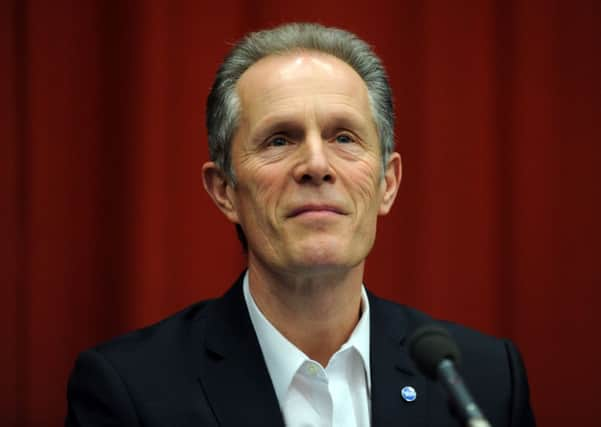Scottish independence poll shows stalling Yes vote


An ICM survey, conducted for Scotland on Sunday, shows backing for Yes stands at 34 per cent, a fall of 2 percentage points since a comparable poll last month.
Advertisement
Hide AdAdvertisement
Hide AdThe decline in support for Yes has been matched by a two point rise for No, which has increased its backing to 45 per cent since June.
The fall in Yes support was accompanied by polling evidence suggesting that pro-UK parties’ strategy to offer more Holyrood powers has hardened the No vote.
Yes Scotland’s failure to make the breakthrough required for victory on 18 September was underlined when the 21 per cent of people who were “undecided” were removed from the equation.
When the “don’t knows” were excluded, Yes support was 43 per cent, down 2 percentage points on last month’s ICM poll. No was comfortably ahead on 57 per cent, an increase of 2 percentage points on last month.
Last night, Professor John Curtice of Strathclyde University said Yes Scotland has much work to do before 18 September if it was to overturn the No campaign’s lead. “This is not good news for Yes. According to most polling evidence including this – they have been flatlining for the last three months,” Curtice said.
“Yes obviously needs to make further progress. The question you constantly ask yourself is what are they going to do that is going to shift it?”
Analysis of today’s ICM poll, which saw 1,002 Scots interviewed between 7 and 11 July, revealed further encouraging signs for Alistair Darling’s Better Together campaign when it looked at attitudes towards more powers for the Scottish Parliament.
The pro-Union Labour, Conservative and Lib Dem parties have produced proposals to create a more powerful Holyrood in the event of a No vote.
Advertisement
Hide AdAdvertisement
Hide AdAlex Salmond and independence campaigners have questioned whether they will deliver, arguing that the only way to guarantee more powers is to vote Yes.
According to the poll, 40 per cent of those questioned believed that more devolution will happen, up 2 points on last month and the highest level recorded in the ICM polls.
Evidence that the pro-Union parties’ more powers strategy was helping shore-up the No vote came when No voters were asked if they thought more devolution would happen. Fifty-six per cent said they thought more powers would be transferred – an increase of 7 points on last month.
Tellingly, the poll also found that 86 per cent of No voters said they would still vote No, even if they thought that more powers would not be delivered.
There was some encouragement for the Yes side in that the poll suggested the gender gap associated with independence support had disappeared.
When “undecided” voters were excluded, 44 per cent of women and 43 per cent of men indicated they would vote Yes.
That finding went against previous polls, which have consistently observed that support for independence is higher among men than women. Polling experts, however, said that the finding on gender should be treated with caution and more evidence was required to back it up.
Last night, Better Together campaign director Blair McDougall said: “As we get closer, people are making up their minds and are breaking for us. It is clear that we have the momentum and that we speak for the majority of Scots.
Advertisement
Hide AdAdvertisement
Hide Ad“The poll also shows that people recognise that if we say no thanks to separation we can have the best of both worlds. Full power over our schools and hospitals and more powers over how we raise and spend money and welfare. A No vote gives us the progress we want and avoids risks we don’t want.”
Yes Scotland chief executive Blair Jenkins said: “A poll last week put Yes support at 47 per cent, this also puts it well above 40 per cent, and we are confident of achieving a majority in September.
“The most significant finding of this poll is that more than a fifth of voters say they are still undecided, and we know that the more people hear about the benefits of independence the more they move to Yes. With just over two months to the referendum, we believe our message that only with the powers of independence can we make the wealth of Scotland work for all the people will win over the large number of people who have yet to make up their minds.
“This referendum is a choice between continued austerity with a Westminster system that is increasingly out of touch and out of step with the people of Scotland, and a new prosperity and fairer country that are the prizes on offer with Yes.”
Jenkins added: “It is also significant that fewer than four in 10 people believe the No campaign’s vague and confused offers of more powers if there is a No vote. The only way to guarantee Scotland gets all the powers it wants and needs is with a Yes vote.”